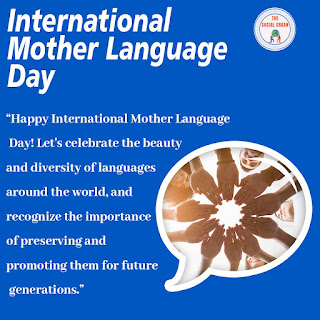International Mother Language Day Paragraph. Celebration, history, and theme for 2023 Mother language day
International Mother Language Day
- An article by The Social Organ
International Mother Language Day is an annual observance that celebrates the diversity of languages worldwide and promotes linguistic and cultural diversity. The day was established by the United Nations Educational, Scientific and Cultural Organization (UNESCO) in 1999 to honor the students who were killed in Bangladesh in 1952 when they protested against the government's decision to make Urdu the official language of East Pakistan. Since then, International Mother Language Day has become an important event that promotes linguistic and cultural diversity and highlights the importance of preserving and promoting mother languages.
The Importance of Mother Language
Mother language is the first language that a child learns from his/her parents or caregivers. It is the language that a child grows up with and is most comfortable speaking. Mother language is the foundation of a child's cognitive and social development. It shapes the way a child thinks, perceives the world, and interacts with others. It is also the basis of a child's cultural identity and heritage. By speaking their mother language, children learn about their culture, history, and traditions. They also develop a sense of belonging and pride in their identity.
Mother language is essential for effective communication. It is the language in which a child can express himself/herself most clearly and fluently. Research shows that children who are taught in their mother language are more likely to succeed academically than those who are taught in a second language. They are also more likely to stay in school and complete their education.
Mother language is also crucial for social and emotional development. It is the language in which children express their feelings, emotions, and experiences. It enables children to communicate with their family and community and to participate in social activities. By speaking their mother language, children develop strong bonds with their family and community and learn about their values and beliefs.
The Challenges of Preserving Mother Language
Despite the importance of the mother language, many languages are at risk of disappearing. According to UNESCO, half of the world's 6,000 languages are in danger of becoming extinct. Every two weeks, a language disappears, taking with it valuable knowledge and cultural heritage. The reasons for the decline of mother languages are many. Some languages are threatened by globalization, urbanization, and migration. Others are suppressed by the dominant culture, politics, and education systems. In many cases, parents and caregivers choose to speak a second language to their children, believing that it will give them an advantage in education and job opportunities.
The loss of the mother language has far-reaching consequences. It leads to the loss of cultural diversity, as each language carries with it a unique perspective on the world. It also undermines the social and emotional development of children, as they lose the ability to express themselves fully in their mother tongue. It can also have economic consequences, as the loss of language skills can limit job opportunities and reduce economic growth.
The Role of International Mother Language Day
International Mother Language Day plays a crucial role in promoting linguistic and cultural diversity and in raising awareness of the importance of preserving mother languages. The day provides an opportunity for governments, educators, and communities to celebrate the diversity of languages and to promote language learning and preservation.
One of the main objectives of International Mother Language Day is to promote multilingual education. UNESCO recognizes that mother language-based education is crucial for effective learning and that it contributes to the preservation of language and culture. The organization encourages governments to develop education policies that support the use of the mother language in education and to provide teachers with training and resources to teach in multiple languages.
International Mother Language Day also promotes the preservation of endangered languages. The day provides a platform for communities to celebrate their language and raise awareness of its importance. It also encourages governments to take measures to preserve endangered languages, such as developing language revitalization programs, providing language education, and promoting language documentation.




Hindi is world's best language
ReplyDelete